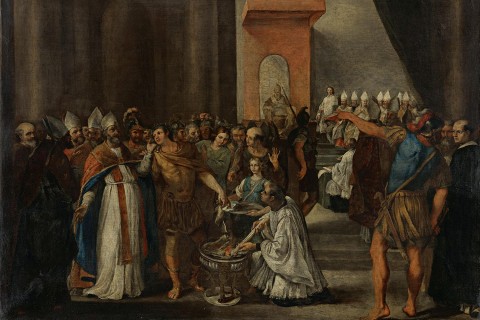December 16, Advent 3C (Luke 3:7-18)
“If we can’t afford two boxes,” my grandmother said, “we can’t afford one.”
My grandfather never questioned the grocery bill. All other expenditures fell subject to his review, but the grocery shopping belonged entirely within my grandmother’s domain. Papa had good reason to be frugal. Though we never went hungry, we lived on relatively little inside our 526-square-foot home in rural South Carolina. Under these circumstances, Papa kept a tight grip on the finances, even meting out our weekly contribution to the church—ten dollars for the offering plate, plus one dollar for each grandchild for Sunday school. Our offering was by no means a widow’s mite, but neither was it stingy in relation to our family’s income.
As far as I know, Papa never discovered the secret my grandmother and I shared. Every Saturday she and I whisked into town in her faded blue Ford Torino. As I pushed our cart up and down the aisles of the Red & White, she carefully selected food in duplicate—two boxes of cereal, two jars of peanut butter, two bags of flour—until our cart looked like an abstract rendering of Noah’s ark with its produce and nonperishable food items arranged two by two.
Then we’d check out (an achingly slow process involving a hefty stack of coupons), load the car with heavy paper grocery bags, and drive straight to the town’s food bank, where my grandmother would donate exactly half of everything she’d just purchased. She bought my silence each week with a small candy bar, which was not immune to her rule: one chocolate treat for me, one for the food bank.
On one of these grocery trips when I was eight or nine years old, I asked my grandmother for a name-brand cereal I’d seen on a television commercial. “We can’t afford that one,” she replied without looking up from her list. “We can if we don’t buy two of them,” I grumbled under my breath. My grandmother’s eyes met mine. She put her list down so as to place her hands firmly on my shoulders. She measured her words as carefully as my grandfather had measured the dollars for our Sunday offering: “If we can’t afford two, we can’t afford one.”
I never asked my grandmother whether our weekly grocery run was a direct response to Luke 3. “Whoever has two coats must share with anyone who has none,” John the Baptist replies to the crowds who seek an escape from the “wrath to come,” and “whoever has food must do likewise.” Given my grandmother’s tendency to interpret scripture more literally than I, the odds are favorable that John’s exhortations laid an unavoidable claim on her heart—a claim that required her obedience through concrete action.
Unlike my grandmother, most of us tend to rationalize our failure to share our material resources, all the while appealing to another way through which we hope to be spared God’s judgment for our greed. Like John’s hearers who relied on God’s covenant with Abraham, we lean heavily on Jesus’ promises of forgiveness and grace, often ignoring our responsibility to love our neighbors. When we remember our baptism, we recall bathing in the love of a God who claims and calls us before we can respond, but we forget that baptism also signifies dying and rising with the Jesus who fed the hungry and healed the outcasts. “What shall we do?” ask the crowds, tax collectors, and soldiers in this passage. We are more inclined to ask, “Isn’t it perfectly rational, even necessary, to hang on to a fleece pullover for the fall, a down coat for winter, and a lightweight rain jacket for spring?” By situating ourselves in a radically different place and time from John, we think we can wiggle our way out of his demands for ethical living.
What do we think gets us off the hook? Are we saved by our theological understanding or our progressive, figurative readings of the text? By our penchant for metaphor, which abstracts the prophet’s words from the reality of our lives and the lives of others? Does God mind if we go about our days as if there are not hurricane victims in Puerto Rico and North Carolina still languishing for food and medicine they need to survive? Is God displeased when we store up for ourselves enough resources to fully fund the capital campaign while children in Flint, Michigan, still go without potable drinking water?
We talk a good game. But most of us, myself included, buy a single box of the expensive cereal.
The question at the heart of this text—“What shall we do?”—differs significantly from “What shall we believe?” or even “What shall we prayerfully discern as our role in mission?” It differs more still from the question that, if we are honest, we know we have asked: “How shall we interpret John’s words in such a way that we may maintain our comfort while our neighbors suffer?” John’s response is clear. Repentance has to do with ethics, with action, with the Holy Spirit’s compelling us to be God’s hands and feet in the world—with attention to the needs of others rather than preoccupation with our own salvation.
By the world’s measure, my understanding of John’s preaching is more nuanced than my grandmother’s. But no advanced degree in theology will ever come close to her faith. “What shall we do?” the people ask the prophet. Sometimes we like to pretend the answer is complicated. Sometimes it really is. But buying two bags of flour is a good start.






